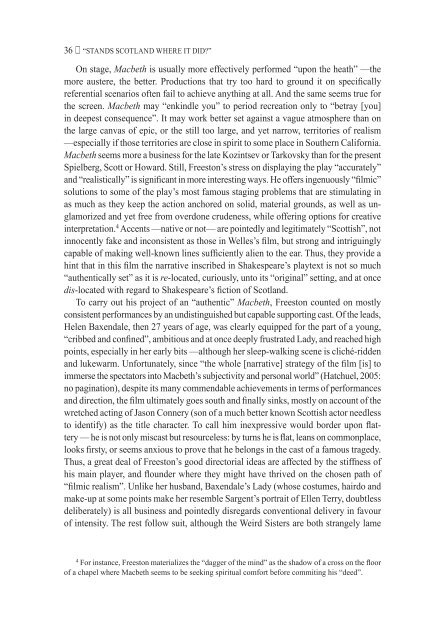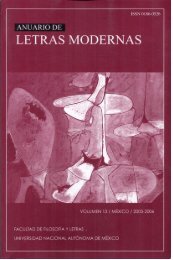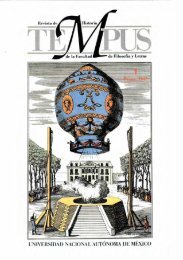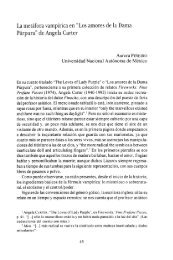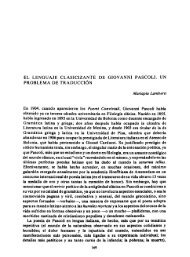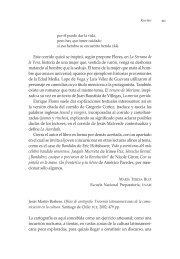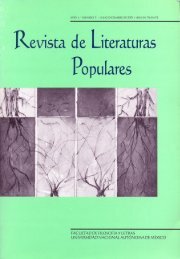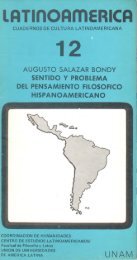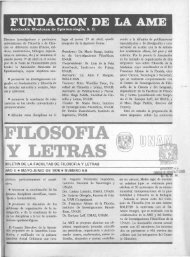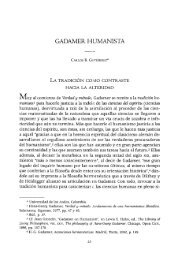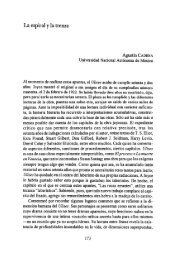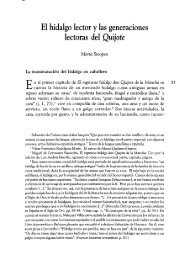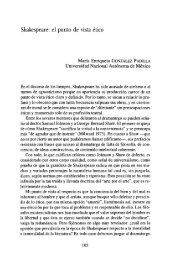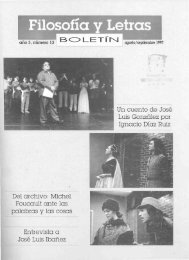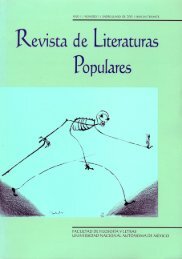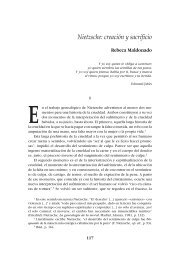Untitled - Repositorio de la Facultad de Filosofía y Letras. UNAM ...
Untitled - Repositorio de la Facultad de Filosofía y Letras. UNAM ...
Untitled - Repositorio de la Facultad de Filosofía y Letras. UNAM ...
Create successful ePaper yourself
Turn your PDF publications into a flip-book with our unique Google optimized e-Paper software.
36 “StANdS ScOtlANd Where It dId?”<br />
On stage, Macbeth is usually more effectively performed “upon the heath” —the<br />
more austere, the better. Productions that try too hard to ground it on specifically<br />
referential scenarios often fail to achieve anything at all. And the same seems true for<br />
the screen. Macbeth may “enkindle you” to period recreation only to “betray [you]<br />
in <strong>de</strong>epest consequence”. It may work better set against a vague atmosphere than on<br />
the <strong>la</strong>rge canvas of epic, or the still too <strong>la</strong>rge, and yet narrow, territories of realism<br />
—especially if those territories are close in spirit to some p<strong>la</strong>ce in Southern California.<br />
Macbeth seems more a business for the <strong>la</strong>te Kozintsev or tarkovsky than for the present<br />
Spielberg, Scott or Howard. Still, Freeston’s stress on disp<strong>la</strong>ying the p<strong>la</strong>y “accurately”<br />
and “realistically” is significant in more interesting ways. he offers ingenuously “filmic”<br />
solutions to some of the p<strong>la</strong>y’s most famous staging problems that are stimu<strong>la</strong>ting in<br />
as much as they keep the action anchored on solid, material grounds, as well as ung<strong>la</strong>morized<br />
and yet free from overdone cru<strong>de</strong>ness, while offering options for creative<br />
interpretation. 4 Accents —native or not— are pointedly and legitimately “Scottish”, not<br />
innocently fake and inconsistent as those in Welles’s film, but strong and intriguingly<br />
capable of making well-known lines sufficiently alien to the ear. thus, they provi<strong>de</strong> a<br />
hint that in this film the narrative inscribed in Shakespeare’s p<strong>la</strong>ytext is not so much<br />
“authentically set” as it is re-located, curiously, unto its “original” setting, and at once<br />
dis-located with regard to Shakespeare’s fiction of Scot<strong>la</strong>nd.<br />
To carry out his project of an “authentic” Macbeth, Freeston counted on mostly<br />
consistent performances by an undistinguished but capable supporting cast. Of the leads,<br />
helen Baxendale, then 27 years of age, was clearly equipped for the part of a young,<br />
“cribbed and confined”, ambitious and at once <strong>de</strong>eply frustrated <strong>la</strong>dy, and reached high<br />
points, especially in her early bits —although her sleep-walking scene is cliché-rid<strong>de</strong>n<br />
and lukewarm. Unfortunately, since “the whole [narrative] strategy of the film [is] to<br />
immerse the spectators into Macbeth’s subjectivity and personal world” (Hatchuel, 2005:<br />
no pagination), <strong>de</strong>spite its many commendable achievements in terms of performances<br />
and direction, the film ultimately goes south and finally sinks, mostly on account of the<br />
wretched acting of Jason Connery (son of a much better known Scottish actor needless<br />
to i<strong>de</strong>ntify) as the title character. to call him inexpressive would bor<strong>de</strong>r upon f<strong>la</strong>t-<br />
tery — he is not only miscast but resourceless: by turns he is f<strong>la</strong>t, leans on commonp<strong>la</strong>ce,<br />
looks firsty, or seems anxious to prove that he belongs in the cast of a famous tragedy.<br />
Thus, a great <strong>de</strong>al of Freeston’s good directorial i<strong>de</strong>as are affected by the stiffness of<br />
his main p<strong>la</strong>yer, and floun<strong>de</strong>r where they might have thrived on the chosen path of<br />
“filmic realism”. Unlike her husband, Baxendale’s <strong>la</strong>dy (whose costumes, hairdo and<br />
make-up at some points make her resemble Sargent’s portrait of Ellen Terry, doubtless<br />
<strong>de</strong>liberately) is all business and pointedly disregards conventional <strong>de</strong>livery in favour<br />
of intensity. The rest follow suit, although the Weird Sisters are both strangely <strong>la</strong>me<br />
4 For instance, Freeston materializes the “dagger of the mind” as the shadow of a cross on the floor<br />
of a chapel where Macbeth seems to be seeking spiritual comfort before commiting his “<strong>de</strong>ed”.


